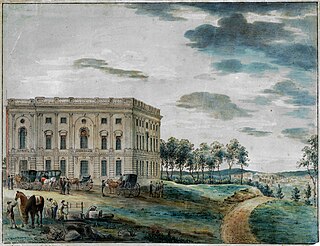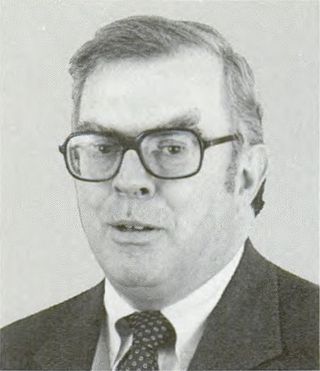
The 2nd United States Congress, consisting of the United States Senate and the United States House of Representatives, met at Congress Hall in Philadelphia, Pennsylvania, from March 4, 1791, to March 4, 1793, during the third and fourth years of George Washington's presidency. The apportionment of seats in the House of Representatives was based on the provisions of Article I, Section 2, Clause 3 of the United States Constitution. Additional House seats were assigned to the two new states of Vermont and Kentucky. Both chambers had a Pro-Administration majority.

The 3rd United States Congress was a meeting of the legislative branch of the United States federal government, consisting of the United States Senate and the United States House of Representatives. It met at Congress Hall in Philadelphia, Pennsylvania from March 4, 1793, to March 4, 1795, during the fifth and sixth years of George Washington's presidency.

The 5th United States Congress was a meeting of the legislative branch of the United States federal government, consisting of the United States Senate and the United States House of Representatives. It met at Congress Hall in Philadelphia, Pennsylvania, from March 4, 1797, to March 4, 1799, during the first two years of John Adams' presidency. In the context of the Quasi-War with France, the Alien and Sedition Acts were passed by Congress. The Acts were overwhelmingly supported by the Federalists and mostly opposed by the Democratic-Republicans. Some Democratic-Republicans, such as Timothy Bloodworth, said they would support formally going to war against France but they opposed the Alien and Sedition Acts which Bloodworth and others believed were unconstitutional.

The 6th United States Congress was the 6th meeting of the legislative branch of the United States federal government, consisting of the Senate and the House of Representatives. It initially met at Congress Hall in Philadelphia, Pennsylvania and then was the first congress to meet in the new Capitol Building in Washington, D.C.. Its term was from March 4, 1799, to March 4, 1801, during the last two years of John Adams's presidency. It was the last Congress of the 18th century and the first to convene in the 19th. The apportionment of seats in House of Representatives was based on the 1790 United States census. Both chambers had a Federalist majority. This was the last Congress in which the Federalist Party controlled the presidency or either chamber of Congress.

Galusha Aaron Grow was an American politician, lawyer, writer and businessman, who served as 24th Speaker of the U.S. House of Representatives from 1861 to 1863. Elected as a Democrat in the 1850 congressional elections, he switched to the newly organized Republican Party in the mid-1850s when the Democratic Party tried to force the extension of slavery into western territories.

Philip Francis Thomas was an American lawyer, mathematician and politician. He served in the Maryland House of Delegates, was the 28th Governor of Maryland from 1848 to 1851, and was Comptroller of Maryland from 1851 to 1853. He was appointed as the 23rd United States Secretary of the Treasury in 1860 in the Buchanan administration. After unsuccessfully standing for the United States Senate in 1878, he returned to the Maryland House of Delegates, and later resumed the practice of law.

The 72nd United States Congress was a meeting of the legislative branch of the United States federal government, consisting of the United States Senate and the United States House of Representatives. It met in Washington, D.C. from March 4, 1931, to March 4, 1933, during the last two years of Herbert Hoover's presidency. The apportionment of seats in this House of Representatives was based on the 1910 United States census. The Senate had a Republican majority. The House started with a very slim Republican majority, but by the time it first met in December 1931, the Democrats had gained a majority through special elections.

The 77th United States Congress was a meeting of the legislative branch of the United States federal government, composed of the United States Senate and the United States House of Representatives. It met in Washington, D.C., from January 3, 1941, to January 3, 1943, during the ninth and tenth years of Franklin D. Roosevelt's presidency. The apportionment of seats in the House of Representatives was based on the 1930 United States census.

James Burnie Beck was a Scottish-American United States Representative and Senator from Kentucky.
The postmaster of the United States House of Representatives was an employee of the United States Congress from 1834 to 1992.

Andrew Jackson Thayer was an attorney and Democratic U.S. congressman from Oregon. A native of New York state, he previously worked as the U.S. Attorney for Oregon. His brother was William W. Thayer, a governor of Oregon. After Congress, Thayer returned to legal work and served as a district attorney and justice of the Oregon Supreme Court.
George Knox Shiel was an American lawyer and politician who served one term as a Democratic U.S. congressman from Oregon from 1861 to 1863.

James Thomas Molloy was elected Doorkeeper of the House of Representatives during the 93rd Congress in 1974 and served through the 103rd Congress. As Doorkeeper, he introduced six Presidents, several heads of state and other dignitaries in joint sessions and other congressional events. Molloy was the last Doorkeeper of the House of Representatives.









